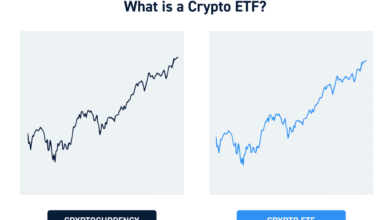JPMorgan Bitcoin Access: A New Era for Clients

JPMorgan Bitcoin Access is set to revolutionize how clients engage with the world’s leading cryptocurrency. In a bold declaration, CEO Jamie Dimon confirmed during the bank’s annual investor day that clients will gain the ability to purchase bitcoin directly, highlighting a significant shift towards cryptocurrency institutional adoption. Historically cautious about digital assets, JPMorgan’s move signals a pivotal moment as it embraces market trends, including the launch of Bitcoin futures at the CME and the growing demand for cryptocurrency investments. This change comes amidst a landscape where digital assets are forecasted to see inflows of $7.5 billion by 2025, reinforcing the urgency for traditional banks to adapt. While Dimon continues to voice his skepticism, asserting that cryptocurrency serves minimal legitimate economic purposes, the bank’s new service has opened a gateway for clients eager to explore bitcoin investment opportunities.
The recent announcement about JPMorgan Bitcoin Access marks a transformative moment in the banking sector’s approach to digital currencies. By allowing customers to buy bitcoin, JPMorgan is not just entering the crypto space; it’s responding to the increasing institutional interest in cryptocurrencies and the necessity for traditional banks to evolve with the times. As discussed by Jamie Dimon, this access comes with a clear caveat about his reservations on the economic value of cryptocurrencies. Nevertheless, the banking giant’s role in facilitating bitcoin transactions reflects the broader trend of enhanced acceptance of digital assets, especially as entities like the CME expand their offerings in bitcoin futures. This pivotal development suggests that even as some industry leaders express doubts, the foundation for a more integrated financial ecosystem may be forming.
Institutional Adoption of Cryptocurrencies: A New Horizon
The recent announcement by JPMorgan Chase to allow clients to purchase bitcoin represents a significant milestone in the evolving landscape of cryptocurrency institutional adoption. As one of the largest U.S. banks, JPMorgan’s foray into direct bitcoin access signifies a thawing of previous stances against cryptocurrencies, showcasing a growing acceptance among traditional financial institutions. This pivot could encourage a slew of other banks to follow suit, translating to a vast expansion of the crypto market as institutional investors gain a foothold.
While Jamie Dimon’s skepticism towards bitcoin persists, the bank’s decision may pave the way for further innovations in digital asset offerings. With regulatory environments becoming more favorable following efforts from the SEC and the FDIC to clarify their stances on cryptocurrencies, other institutions may feel emboldened to dive deeper into the crypto sphere. The importance of aligning with regulatory trends cannot be understated, as a supportive framework would enhance overall trust and safety in the ecosystem, attracting more institutional investors.
JPMorgan Bitcoin Access: Breaking Barriers
JPMorgan’s initiative to provide bitcoin access to its clients is groundbreaking. Under the leadership of CEO Jamie Dimon, the bank is taking a significant step towards embracing the cryptocurrency market, despite his well-known skepticism. By offering a combination of purchasing options without direct custody, JPMorgan is finding a middle ground that could mitigate some regulatory concerns while still catering to the growing interest in digital assets.
This move reflects a changing attitude across the financial sector where the demand for cryptocurrency-related products is surging. Analysts predict that as banks like JPMorgan position themselves to facilitate bitcoin transactions, we could see even more pronounced growth in trading volumes and market participation from institutional investors in the coming years. This shift aligns with broader trends in cryptocurrency adoption and could redefine how financial services engage with digital currencies.
The Impact of Bitcoin Futures on Institutional Trading
The launch of bitcoin futures on platforms like CME has marked a pivotal moment for institutional trading, allowing large investors to hedge against price volatility while engaging with cryptocurrency. This innovative trading tool offers institutions a layer of protection, and as the popularity of bitcoin futures rises, more institutional investors are likely to incorporate them into their portfolios. With JPMorgan now opening the door to bitcoin transactions, the synergy of futures and spot trading may significantly boost cryptocurrency market liquidity.
Furthermore, the futures market has been instrumental in demystifying bitcoin for institutional players, providing a structured environment for trading and investment. As financial institutions such as JPMorgan provide more opportunities to access bitcoin, it is expected that the future could see massive inflows into the crypto sector, reflected in reports estimating digital asset inflows could reach upwards of $7.5 billion by 2025.
Market Reactions to Jamie Dimon’s Bitcoin Commentary
Jamie Dimon’s rhetoric about bitcoin has consistently stirred reactions within the financial realm, oscillating between skepticism and recognition of its potential. His comments during the 2023 Senate hearing highlight a fundamental divide in the perception of cryptocurrencies amongst financial leaders. While Dimon acknowledges the utility of bitcoin for illicit activities, his comments also inadvertently stimulate discussions about regulation, security, and the legitimacy of digital assets in the financial system.
Despite his divisive views, Dimon’s candidness sparks interest from investors and analysts alike, leading to increased discussions on the merits and pitfalls of digital currencies. His comments might deter some traditional investors, but they also challenge others to disregard the skepticism and explore the technological advancements underpinning cryptocurrencies, further legitimizing the dialogue surrounding digital asset inclusion in investment strategies.
Regulatory Landscape: The Future of Bitcoin Access
The regulatory landscape surrounding cryptocurrencies is evolving, with recent changes from agencies like the SEC signaling a more cohesive approach to digital asset regulation. JPMorgan’s introduction of bitcoin access is timely, as these regulatory adjustments could eliminate some previous barriers that hindered institutional engagement in the crypto space. By aligning with this evolving regulatory framework, financial institutions are better positioned to offer secure and compliant solutions to their clients.
The future of bitcoin investment will be significantly shaped by how regulations adapt to the rapid evolution of digital currencies. With banks like JPMorgan paving the way, there is an expectation for regulations to become more streamlined, fostering a safer environment for investors. Such changes are crucial for the continued growth of cryptocurrencies, particularly as institutional demand surges alongside a more favorable regulatory backdrop.
Coinbase Security Breach: Implications for Institutional Adoption
Recent security breaches at cryptocurrency exchanges, such as Coinbase, have raised serious concerns, particularly among institutional investors wary of risks associated with digital assets. The FBI’s criminal probe into Coinbase’s practices has intensified scrutiny on the security protocols of these platforms, prompting major financial institutions like JPMorgan to reevaluate their strategies when venturing into the cryptocurrency market. As security continues to be a paramount concern, institutions must balance the innovative potential of cryptocurrencies against risk mitigation.
The implications of these breaches extend beyond the immediate financial impact; they also affect public perception and trust in the entire industry. With JPMorgan venturing into bitcoin access while simultaneously addressing security risks, the bank sets a precedent that highlights the dual necessity of innovation and security in the crypto space. Future institutional adoption will depend heavily on the resolution of such security challenges, ensuring that adequate measures are in place to protect digital assets.
Future Digital Asset Inflows: Predictions for 2025
Forecasts for digital asset inflows suggest that institutional interest will skyrocket by 2025, potentially reaching $7.5 billion. As traditional financial institutions like JPMorgan begin to embrace bitcoin access, this prediction could materialize, driving broader engagement across the market. Such inflows could be fueled by a mix of trading products, including spot bitcoin ETFs and other innovative investment vehicles designed to cater to institutional investors.
Increased participation from institutional investors is poised to give the cryptocurrency market a much-needed boost, enhancing its legitimacy and stability. As firms adapt to accommodating this influx of capital, the market may become more resilient and capable of weathering volatility. The continued innovation and acceptance of digital assets could redefine financial markets in the upcoming years, establishing a new norm for trading and investment.
Cross-industry Movement: Fintech and Bitcoin
The intersection of fintech and bitcoin is increasingly important as traditional financial institutions look to leverage emerging technologies to enhance their service offerings. Companies like Digiasia, which plan to implement significant bitcoin treasury reserves, illustrate a growing trend where fintech firms integrate cryptocurrencies into their operations. Such movements demonstrate a shift in how digital assets are viewed within the financial ecosystem, moving from speculative tools to integral components of financial strategy.
As maturating relationships develop between fintech organizations and cryptocurrencies, a broader acceptance of digital assets at every level of finance is expected. The mainstreaming of bitcoin and other digital currencies could encourage more innovative financial products and services, benefiting both banks and consumers alike. This evolving dynamic may invite newcomers into the cryptocurrency space, potentially leading to an influx of capital and new participants.
The Role of Public Sentiment in Bitcoin Adoption
Public sentiment plays a crucial role in the acceptance and adoption of bitcoin, particularly as discussions around regulation, institutional involvement, and security emerge. CEO Jamie Dimon’s influence as a prominent banker shapes public perceptions, swaying investor confidence positively or negatively. Positive sentiment coincides with bullish markets, while skepticism can lead to pullbacks, illustrating the impact of leadership opinions in the financial realm.
With increasing public interest in cryptocurrencies, financial service providers have the opportunity to reshape narratives through education and transparency. By addressing concerns surrounding bitcoin and articulating a clear stance on its potential, organizations can foster a positive dialogue that may inspire more consumers to engage with digital assets. This ongoing relationship between public sentiment and market dynamics will play a significant role in shaping the future of bitcoin and its institutional adoption.
Frequently Asked Questions
What is JPMorgan Bitcoin Access and how does it reflect institutional adoption of cryptocurrency?
JPMorgan Bitcoin Access refers to the bank’s recent move to allow its clients to buy bitcoin directly, a significant step toward cryptocurrency institutional adoption. This initiative, confirmed by CEO Jamie Dimon, symbolizes a shift from purely futures-based crypto instruments to direct access for qualified clients, potentially paving the way for greater participation in the bitcoin market by institutional investors.
How does Jamie Dimon’s perspective influence JPMorgan Bitcoin Access?
Despite Jamie Dimon’s public mistrust of bitcoin, his announcement of JPMorgan Bitcoin Access demonstrates the bank’s recognition of the demand for cryptocurrency services among clients. Dimon emphasizes that while he personally doubts the economic legitimacy of bitcoin, he supports clients’ rights to purchase it, underlining a complex relationship between skepticism and service provision in the context of cryptocurrency.
What are the implications of JPMorgan’s Bitcoin Access for bitcoin futures and CME?
JPMorgan Bitcoin Access may increase interest in bitcoin futures, particularly those offered by the CME (Chicago Mercantile Exchange), as clients now have the option to directly buy bitcoin. This could enhance liquidity and trading volume in both direct bitcoin purchases and futures contracts, indicating a harmonized push towards more comprehensive crypto investment opportunities.
How does the increase in digital assets inflows by 2025 affect JPMorgan Bitcoin Access?
With projections indicating that digital assets inflows could reach $7.5 billion by 2025, JPMorgan Bitcoin Access is timely and aligns with market trends. This anticipated influx underscores growing institutional appetite for cryptocurrencies, which could bolster JPMorgan’s strategy and offerings related to bitcoin and other digital assets.
What security measures are in place regarding JPMorgan’s Bitcoin Access amidst concerns like the Coinbase security breach?
While JPMorgan will provide access to bitcoin purchases, they will not provide custody services, indicating a focus on minimizing security risks associated with digital assets. This approach is particularly relevant in light of security issues such as the Coinbase security breach, highlighting the bank’s commitment to client safety while navigating the complexities of cryptocurrency.
| Key Points | Details |
|---|---|
| JPMorgan Client Access | JPMorgan confirms clients can purchase Bitcoin, a shift from past policies. |
| CEO’s Skepticism | Jamie Dimon maintains distrust toward Bitcoin despite allowing client access. |
| Policy Shift | Previous focus was on futures-based instruments, not direct Bitcoin. |
| Regulatory Landscape Changes | U.S. regulatory bodies are easing restrictions on cryptocurrency. |
| Industry Comparisons | Other financial firms, like Morgan Stanley, are exploring crypto more openly. |
| Inflation of Bitcoin’s Market Presence | Bitcoin’s value hit $105K recently amid various market dynamics. |
Summary
JPMorgan Bitcoin Access signifies a transformative moment in financial services as the bank prepares to offer its clients the opportunity to directly purchase Bitcoin. Although CEO Jamie Dimon expresses continued skepticism about the cryptocurrency, this foray into direct access reflects a larger trend toward institutional adoption of digital assets. While JPMorgan remains cautious, the evolving landscape suggests increasing acceptance and support for cryptocurrency, indicating a critical shift in how mainstream finance engages with this innovative market.



